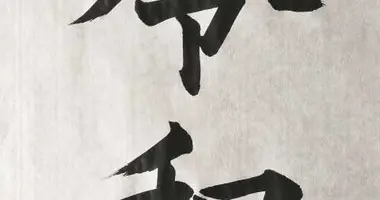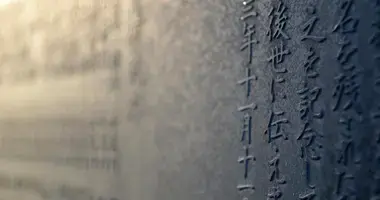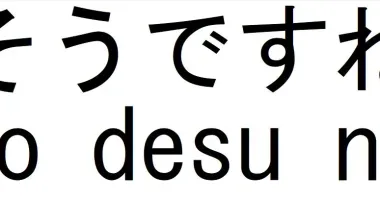Aizuchi: the art of Japanese conversation
- Published on : 25/04/2024
- by : Ph.L
- Youtube
Aizuchi, a fundamental element of Japanese communication, reveal all the subtlety and richness of the Japanese language. These little interjections, so characteristic of Japanese exchanges, play a crucial role in the art of conversation. Much more than a mere linguistic tic, aizuchi reflect a culture of active listening and mutual respect. Let's discover together this fascinating practice, which may seem confusing to the uninitiated, but is essential to effective communication in Japanese.
What are aizuchi and where do they come from?
Aizuchi (相槌) are interjections or short phrases uttered by the interlocutor during a Japanese conversation. Their main function is to show the speaker that he or she is being listened to attentively. Interjections can take a variety of forms, from simple onomatopoeia to complete sentences.
The origin of the term "aizuchi" is particularly interesting.
It comes from the world of blacksmithing, where it originally referred to the sound of the blacksmith's and apprentice's hammers.
This metaphor perfectly illustrates the dynamics of a Japanese conversation: the speaker (the blacksmith) leads the discussion, while the interlocutor (the apprentice) responds with aizuchi, like the echo of hammer blows.
Among the most common aizuchi are expressions like "hai" (はい, yes), "ee" (ええ, yes), "sou desu ne" (そうですね, I see), or "naruhodo" (なるほど, I understand). These interjections are used to punctuate conversation and avoid silences that could be interpreted as a lack of interest or understanding.
The importance of aizuchi in Japanese culture
In Japanese culture, aizuchi are of the utmost importance. They are much more than a simple linguistic tool; they represent a mark of respect and consideration towards the interlocutor. Their use demonstrates active and attentive listening, values that are highly valued in Japanese society.
The absence of aizuchi during a conversation can be perceived as a lack of interest or politeness. For the Japanese, silence while someone is speaking can be a source of unease, even anxiety. Aizuchi therefore help maintain a constant flow of communication and reassure the speaker that attention is being paid.
What's more, aizuchi play a crucial role in the very structure of Japanese conversation. Unlike French, where sentences are generally shorter, Japanese is characterized by long sentences punctuated by pauses. These pauses are opportunities for the speaker to insert aizuchi, creating a real dialogue, even when only one person seems to be speaking.
How to use aizuchi correctly
Correct use of aizuchi requires finesse and practice. Here are a few essential rules to keep in mind:
First of all, it's important to choose the right moment to insert an aizuchi. Generally speaking, natural pauses in speech, often after a particle or at the end of an idea, are ideal. The aizuchi should be quick and unobtrusive, fitting naturally into the flow of the conversation without interrupting it.
The type of aizuchi should also be adapted to the context. For example, "hai" (はい) is more formal than "un" (うん), which is used in familiar contexts. Similarly, the intonation and intensity of aizuchi can vary according to the emotion or surprise you wish to express.
Finally, it's crucial not to overuse aizuchi. Although frequent, they must not become intrusive. A good balance is needed to keep the conversation flowing and pleasant.
The different types of aizuchi and their meanings
There are a wide variety of aizuchi, each with its own nuance and context of use. Here are some of the most common:
- To nod: "Hai" (はい, yes), "Ee" (ええ, yes), "Un" (うん, yeah)
- To show understanding: "Naruhodo" (なるほど, I understand), "Sou desu ne" (そうですね, I see)
- To express surprise: "Hee" (へえ, really?), "Hontou ni" (本当に, really?)
- To ask for confirmation: "Sou desu ka" (そうですか, is it true?)
It's important to note that these aizuchi can be combined or repeated to accentuate the effect. For example, "Sou sou sou" (そうそうそう) is an energetic way of expressing agreement.
Challenges for non-Japanese when using aizuchi
For non-Japanese, using aizuchi can present several challenges. The first is often the difficulty of perceiving the appropriate moments to insert them into the conversation. Japanese sentence structure, very different from that of Western languages, can make this task particularly arduous.
Another challenge lies in the tendency to interpret aizuchi as signs of agreement rather than simply listening. Indeed, in many cultures, saying "yes" or "I understand" implies agreement with what is being said. In Japanese, however, these expressions are often used simply to signify that one is following the conversation.
Finally, non-Japanese may be uncomfortable with the frequency of aizuchi. What may seem like a constant interruption to a foreigner is in fact a normal and expected part of Japanese conversation. It takes time to get used to it and integrate it naturally into your speech.
The benefits of mastering the art of aizuchi
Mastering the art of aizuchi has many advantages for anyone wishing to communicate effectively in Japanese. First and foremost, it creates a stronger bond with your interlocutors. By showing that you're attentive and committed to the conversation, you encourage a richer, more pleasant exchange.
What's more, proper use of the aizuchi can help you better understand the nuances of the speech. By being actively involved in listening, you're better able to grasp the subtleties of Japanese language and culture.
Finally, mastering aizuchi is an excellent way of integrating more easily into Japanese society. This skill is highly valued and can make all the difference in professional or social situations. It demonstrates an in-depth understanding of Japanese communicative culture, far beyond mere linguistic mastery.
Practical tips for integrating aizuchi into your Japanese conversations
To integrate aizuchi effectively into your Japanese conversations, here are a few practical tips:
1. Start by listening carefully to the conversations of native Japanese speakers. Observe when and how they use aizuchi. It's a great way to familiarize yourself with the natural rhythm of Japanese conversation.
2. Practice regularly. Don't hesitate to use aizuchi even in your everyday French conversations. This will help you develop the reflex to use them.
3. Vary your aizuchi. Don't limit yourself to just one type of interjection. Learn to use different aizuchi depending on the context and your relationship with the speaker.
4. Pay attention to non-verbal language. Aizuchi are often accompanied by head nods or other subtle gestures. Incorporate these aspects into your practice.
5. Don't forget that the use of aizuchi goes hand in hand with other aspects of Japanese politeness, such as expressions of thanks or apologies. Familiarize yourself with these expressions for more complete communication.
In conclusion, mastering the art of aizuchi is a valuable skill for anyone wishing to communicate effectively in Japanese. Much more than just a linguistic aspect, it's a window onto Japanese culture and mentality. With practice and patience, you'll be able to integrate aizuchi naturally into your conversations, greatly enriching your experience of Japanese language and culture. Don't forget to consult our dossier: A little vocabulary and some kanji to know to deepen your linguistic knowledge.
















